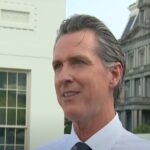


President Donald Trump is sending the National Guard to Memphis, Tennessee, signaling a bold escalation in his fight against urban crime.
His announcement, made during a lively "Fox & Friends" appearance, underscores a commitment to restoring safety in cities he deems troubled. Yet, one wonders if this heavy-handed approach will truly address the root causes or just stir more tension.
Trump revealed plans to deploy not only the National Guard but possibly the Army to Memphis, following a successful stint in Washington, D.C. "Memphis is deeply troubled," he declared, promising to "fix that just like we did in Washington." His confidence is admirable, but critics might argue it oversimplifies a complex issue.
The president’s anti-crime push began over the summer in the nation’s capital, where National Guard troops patrolled alongside a surge of federal law enforcement.
Republicans claim this made D.C. safer, while Democrats called it an overreach, sparking heated debates on Capitol Hill. Memphis now faces a similar test, with its outcome still uncertain.
Tennessee Governor Bill Lee, a Republican, has been in close talks with the Trump administration for months, crafting a multi-phase plan to tackle Memphis crime.
"For months, I have been in constant communication with the Trump Administration to develop a multi-phased, strategic plan," Lee said. His enthusiasm for federal help contrasts sharply with progressive skepticism about militarizing local policing.
The strategy involves a coordinated effort with the Tennessee National Guard, FBI, Tennessee Highway Patrol, and Memphis Police Department. Lee emphasized working closely to define each agency’s role to best serve Memphians. But will this alphabet soup of law enforcement deliver results or just bureaucratic gridlock?
Memphis Mayor Paul Young, a Democrat, supports the initiative, aligning with Lee and Trump despite his party’s broader objections. "We agree with Governor Lee that effective support for Memphis comes through focused initiatives," Young stated. His pragmatic stance might irk progressive purists who reflexively distrust federal intervention.
Just before Trump’s announcement, Lee deployed 50 Tennessee Highway Patrol troopers to aid the Memphis Police Department. Ongoing FBI and state police operations have already shown progress, according to local leaders. Yet, throwing more boots on the ground risks looking like a political stunt if results don’t follow.
Young highlighted the need for financial resources, more patrol officers, and stronger investigative support to bolster the Memphis Police Department.
His focus on prevention and intervention suggests a deeper understanding of crime’s complexities than a simple show of force. Trump’s plan might benefit from listening to such local insights.
"What we need most are financial resources for intervention and prevention," Young said, underscoring the limits of enforcement alone. His words hint at a truth often ignored by tough-on-crime rhetoric: prevention beats reaction. Will the National Guard’s presence align with this broader vision?
Representative David Kustoff, a Tennessee Republican whose district includes Memphis, applauded Trump’s decision. "I support President Trump’s decision to send the National Guard to Memphis," Kustoff said, pledging to secure more federal resources. His cheerleading reflects GOP unity but sidesteps concerns about federal overreach.
Kustoff emphasized the need for permanent federal law enforcement to work with state and local officials. His vision of long-term collaboration sounds promising, but could clash with local autonomy. Memphis residents might wonder who’s really calling the shots.
Trump’s focus on Memphis came after he admitted he’d prefer targeting Chicago, where local leaders rebuffed his plans. Illinois Governor JB Pritzker and Chicago Mayor Brandon Johnson clashed with the administration, wary of federal troops. Memphis, with its cooperative local leaders, became the easier choice—but at what cost?
In Washington, D.C., Trump’s summer deployment of National Guard troops and federalization of local police stirred controversy but yielded results, per Republicans. D.C. Mayor Muriel Bowser, despite Democratic criticism, acknowledged reduced crime rates after signing an executive order for federal cooperation. Her reluctant pragmatism offers a blueprint Memphis might follow—or reject.
"Every Memphian deserves to live in a safe neighborhood," Lee declared, echoing a universal sentiment. Yet, a Department of Justice report from December 2024 criticized the Memphis Police Department for excessive force and racial discrimination, complicating the narrative of a simple fix. Federal troops might restore order, but can they rebuild trust?



